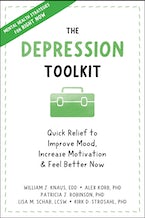By William J. Knaus, EdD, Alex Korb, PhD, Patricia J. Robinson, PhD, Lisa M. Schab, LCSW, and Kirk D. Strosahl, PhD, coauthors of The Depression Toolkit
What to Know
Checking out at the supermarket, you’re presented with an array of enticing candy bars and magazines. Do you stick to your shopping list or reach for a candy bar? The key to understanding impulses is that everything pleasurable releases dopamine in a specific part of your brain called the nucleus accumbens. Sex releases dopamine. Winning money releases dopamine. Drugs release dopamine. Chocolate releases dopamine.
The really interesting thing about the brain, however, is that it learns what’s pleasurable and how to anticipate getting it. For example, when you eat a candy bar for the first time, dopamine is released. The next time you pick up a candy bar, dopamine is released as soon as you open the wrapper. And the next time, dopamine is released simply when you see the candy bar from across the room. Pretty soon, dopamine is released as soon as you walk into the store, just from the anticipation of seeing it, opening it, and eating it.
With impulses, something you do or sense triggers the anticipation of a specific pleasurable outcome. The problem is that the dopamine that is released in anticipation of pleasure actually motivates the actions that lead to that pleasure. Each step along the way gives you a little boost of dopamine that propels you on to the next step.
If you were a caveman, your impulses wouldn’t be such a problem. Life would be pretty simple. If something tasted good, you’d eat as much as possible, and if something felt good, you’d do it as much as possible. Nowadays, though, there are too many easily obtainable pleasures which hijack your brain with dopamine and create a tendency to act for immediate gratification.
It becomes even more problematic in depression, because when you’re depressed, there’s less dopamine activity in your brain in general. First, that means things that used to be enjoyable no longer are. Second, with reduced dopamine activity, the only things that motivate are things that release lots of dopamine, such as junk food, drugs, gambling, and porn. All these impulses mean your actions are guided only by what’s most immediately pleasurable, which is not usually good for you in the long term. And while most impulses are easy to recognize, bad habits—which insidiously become routine—are more difficult to spot.
What to Do
1. Figure out your triggers. It’s much easier to avoid temptation than to resist it. If you know what triggers a particular habit, sometimes you can get rid of that habit simply by removing that trigger from your life. For example, Billie realized he was watching too much television, and the trigger was seeing the television set itself. He moved it out of his bedroom, and now, he doesn’t have a problem watching too much television. As another example, if you don’t want to buy cookies, don’t walk down the cookie aisle at the supermarket. Seeing all those delicious baked goods will release dopamine and push you toward buying them.
2. Take a deep breath. When you start to feel antsy or compelled to act on a bad habit, take a deep breath. Let it out slowly, then take another deep breath. Repeat as necessary. Long, slow breathing calms the brain’s stress response.
3. Make a list of activities you find pleasurable. Whenever you feel triggered toward doing something you know is a bad habit, like binge-watching TV or overeating, go to your activities list instead.
PP. 52-54 Excerpt taken from The Depression Toolkit
Written by a veritable dream team of mental health experts, this short, easy-to-use guide offers evidence-based skills grounded in mindfulness, acceptance and commitment therapy (ACT), cognitive behavioral therapy (CBT), and behavioral activation to help you effectively manage negative thoughts, rediscover hope, and develop healthy habits. If you’re the type who likes to cut through the clutter and get to the heart of the matter, pick up The Depression Toolkit, and pick up the tools inside—relief is only pages away.



 2024 Peace Playbook: 3 Tactics to Avoid Clashes with Your Partner
2024 Peace Playbook: 3 Tactics to Avoid Clashes with Your Partner